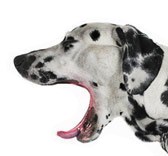Coughing
 Coughing is a symptom, not a disease. Coughing can be symptomatic of kennel cough, respiratory infection, heart disease, heartworms, allergies, asthma, cancer, leptospirosis, and more. If the coughing is accompanied by gasping for breath, see the nearest veterinarian immediately. This could be a life-threatening condition.
Coughing is a symptom, not a disease. Coughing can be symptomatic of kennel cough, respiratory infection, heart disease, heartworms, allergies, asthma, cancer, leptospirosis, and more. If the coughing is accompanied by gasping for breath, see the nearest veterinarian immediately. This could be a life-threatening condition.
If you think your pet is choking, clear the airway and perform the Heimlich maneuver, if necessary, as described in the choking section of the First Aid page. If your pet has developed a persistent cough, see a holistic veterinarian for an accurate diagnosis before attempting to treat the condition. If you know the condition, see the appropriate section for more information.
Kennel Cough
Also called canine infectious tracheobronchitis, kennel cough is a respiratory infection that can be caused by a number of viruses and is often complicated by bacterial infections. It’s highly contagious among dogs. Symptoms include a hacking cough, gagging, sneezing, fever, nasal discharge, and the coughing up of mucus. For general information on boosting the immune system, preventing infections, and speeding up recovery, see Infections.  This condition usually clears up on its own within ten days to three weeks. If your dog is in poor health, and is not recovering, see a holistic veterinarian. If left untreated, the infection could lead to pneumonia. You also ought to get an accurate diagnosis, as coughing is a symptom of many diseases, some of them serious. See the section, above, on coughing.
This condition usually clears up on its own within ten days to three weeks. If your dog is in poor health, and is not recovering, see a holistic veterinarian. If left untreated, the infection could lead to pneumonia. You also ought to get an accurate diagnosis, as coughing is a symptom of many diseases, some of them serious. See the section, above, on coughing.
In Dr. Pitcairn’s Complete Guide to Natural Health for Dogs and Cats, Richard Pitcairn says this about kennel cough:
Antibiotics are not recommended in most cases, because the disease is viral. Often cough suppressants are used but they do not help much and can have unpleasant side effects. The most effective thing to do is to place the affected dog in a steam-filled room (such as a bathroom with a tub full of hot water or after a running hot shower) or in a room with a cold-mist vaporizer. Veterinarians recognize this as a disease that just has to “run its course” (two or three weeks) before recovery. If possible, isolate your dog, since some of these viruses may also affect cats and people.
Dr. Pitcairn also emphasizes building the immune system and strengthening overall health with a natural, raw meat diet balanced with plenty of antioxidants. He suggests an herbal cough syrup, peppermint, or mullein to help the dog with the coughing discomfort.
Respiratory Infections
 Respiratory infections can be bacterial or viral. See Infections for general information. Feline and canine flus are different than human flu.
Respiratory infections can be bacterial or viral. See Infections for general information. Feline and canine flus are different than human flu.
Feline influenza (flu) is also referred to as feline viral rhinotracheitis (FVR), feline herpes (FHV-1 or Feline Herpesvirus-1) and feline coryza. For more information, see Viral Infections. If your dog or cat is showing signs of a respiratory problem, see a holistic veterinarian for a proper diagnosis.